TRAD II
I am who I am
With playful desire, Hubert von Goisern and his musicians have resurrected folk songs on Trad 2, with which he is touring through the country from February 2004. Was.ist.los? talked to HvG on the Krippenstein about homeland, Musikantenstadl, pop, film and message.
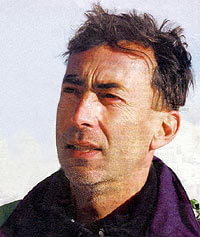 Why
did you record Trad 2 on the Krippenstein of all places?
Why
did you record Trad 2 on the Krippenstein of all places?
After I heard that they were locked up the hotel in summer 2002, and the Krippenstein for me is somewhere where I have spent a great deal of time, I thought to myself, that is ideal. A closed hotel, where everything still works, where you have peace, where you can withdraw. We packed my whole studio into boxes, dragged all the instruments up, recorded for two weeks, packed everything together and gone back into the valley with heavy hearts. But it was so much more casual up there, so we packed again and went up there again and did the post-production. I thought we would have to do the mixing in a proper studio because of the acoustics. But then we went up there a third time. All three times we had a full moon, super weather.
How was it for the others?
Everybody really liked it. Here, you don't come away from the production. You can go outside, but there is nothing there. You come much more to yourself and to what you are doing.
The hotel would die to you, if it wasn't there any more?
The hotel has a certain morbidity, which is more attractive for an artistic work, than something that has no patina, no history.
What is important to you with the interpretations?
That nobody tells me how I should do it when I play music. But so far, many in the classical folk music scene have not done so. That is our main conflict.
A tour came after Iwasig, now Trad 2. Is a chapter closed with it?
Not completely. I will go on tour next year with the new lineup and a programme from both Trad CDs. But then it suits. After that, I will see what happens.
Do you have a plan?
Not really. It's like here on the Krippenstein when I look around. You have 360 degrees and it is exciting everywhere. My life also seems like this.
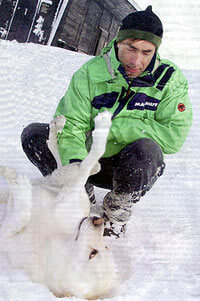 Have
you brought anything up with you?
Have
you brought anything up with you?
Yes, to the mixing. A book about the beginning of mountain climbing.
What do you still do in terms of mountain climbing?
Nothing. I walk across the plateau, or go up to a hut. I simply like to wander through nature, through the forest too. I last went climbing three years ago.
Do you take an instrument with you, for example, a harmonica?
I have my voice anyway, that's ok. When I like, I then let it out somewhere. And then the dog yodels the second voice to it.
Do the people in a hut say to you: Go, Hubert, sing something?
Yeah, but I seldom go to huts when I see that there are people there. I'd rather make a detour. I like being alone. It was always so. I am not someone who leaves, who has a regular pub. When I am looking for company, I look for my friends.
You have been at home in Salzburg for eight years. Is Goisern your emotional homeland?
When I hear the sound in dialect, then a feeling of homeland is there. The mountains, the panorama, have such a familiarity which is certainly strongest in Goisern, in the Salzkammergut. But above all, homeland for me is a place where I take part. At home you mince your words less. With people who are unfamiliar to you, you do not get into arguments so quickly. In my opinion, Salzburg is too bourgeois a city. But just the fact that I say that also shows that I am at home there.
Were you ever invited to the Musikantenstadl?
As far as I know, yes. Again and again there is also an attempt on the side of my management, for me to appear there. But I have succeeded until now, to persuade everyone - and above all myself - that it would not be good. I can't do anything with them.
What do you think of the quality of such programmes?
I think that the quality of the musicians who appear in Musikantenstadl is not second class. It is all done very well, only the message that comes over does not speak to me. There is too little behind it. I also like it harmonious and I think to myself, actually we're all a big family - but the permanent grin is simply not for me because the world is not permanently grinning.
What do you think of the current pop music?
It is at least 50%, probably 80% programmed. I am too much a musicians and love musicians too much than that I would like to stop working with musicians and playing an instrument myself.
Is there a danger that the people in the Salzkammergut have a troubled relationship with Trad 2, who say, no, that is not our music?
That is possible, but not just in the Salzkammergut. There are a few such 200%-ers over the whole of Austria. But as Qualtinger said: There is a destruction through acknowledgment. And as long as these people do not recognise me, I do not feel destroyed.
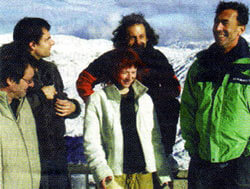 Do
you plan to work in a film again?
Do
you plan to work in a film again?
We are now making a film on the basis of Trad 2, which will be broadcast on Bayerischer Rundfunk on 22nd December. The ORF is still thinking about whether they will show it sometime next year. Julian Pölsler, with whom I have been friends for a long time, is directing.
Why is the ORF making a fuss?
Perhaps it is to do with that fact that I am too difficult and unpredictable for them.
Missing recognition?
True. There was once a time when they played Hiatamadl round and round and I was passed through the various programmes. I was at Ö3 for an afternoon programme and was going through the corridors with an editor. He said: "Do you know, at the moment, everybody is really on the Hubert von Goisern wave. Right now people who don't really like it daren't say that they don't like it. But you will see, there will be a time when those who like it don't dare say that they like it." And he was right.
What message is there in your own songs?
Be yourself. I am who I am, and see that I manage with that. I do not like everything about myself. But it is simply so.
The man from the mountains
Hubert von Goisern records the new CD Trad II in a empty mountain hotel
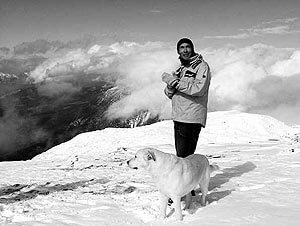 Hubert
von Goisern trudges wordlessly through partly knee-deep new snow up the
Krippenstein. Dog Bongo accompanies him, dozens of editors, radio reporters,
photographers, camera operators follow in a pack behind. CD presentation
at 2100 metres, the temperature sinks, the excitement rises. Arrived
up on the plateau, postcard views are offered, down into the Goisern
valley, over to the Dachstein massif. Great. And now music? No. And now?
Nothing. "It's great that you're here," says Hubert. Then he
is silent. For the message is the mountain itself. "Mountains give
strength," says Hubert later in the MZ interview. For the ZDF lowland
teams remains to be added: the mountains also take strength from some
- and make cold, wet feet.
Hubert
von Goisern trudges wordlessly through partly knee-deep new snow up the
Krippenstein. Dog Bongo accompanies him, dozens of editors, radio reporters,
photographers, camera operators follow in a pack behind. CD presentation
at 2100 metres, the temperature sinks, the excitement rises. Arrived
up on the plateau, postcard views are offered, down into the Goisern
valley, over to the Dachstein massif. Great. And now music? No. And now?
Nothing. "It's great that you're here," says Hubert. Then he
is silent. For the message is the mountain itself. "Mountains give
strength," says Hubert later in the MZ interview. For the ZDF lowland
teams remains to be added: the mountains also take strength from some
- and make cold, wet feet.
Below the Krippenstein peak, at the end of the cable railway, stands a hotel, silent and empty. The enterprise has been resting for two due to the lack of tenants. Hubert von Goisern quartered himself in this hotel at the beginning of the year in order to record the continuation of his CD Trad. The 51 year old had been lured by "seclusion and morbidity". "Here you are thrown back to yourself a great deal," says Hubert. It also began with that in Stephen King's Shining. But how great, everyone taking part is in good health, even the band with Monika Drasch (violin, vocals), Max Lässer (strings), Arnulf Lindner (bass) and Bernd Bechtloff (percussion) overcame the "group dynamic demand" (Goisern) in the mountain cloister.
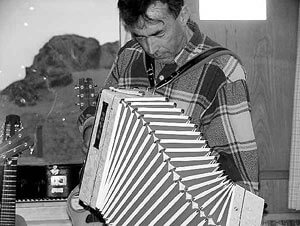 Likes
its predecessor, Trad II (BMG) pairs folk
music with the Goisern factor. Hubert defines it so: "I don't give
a shit." With this in mind, the singer and multi-instrumentalist takes
melodies, lyrics and yodels from the Salzkammergut and trains, reworks,
prepares them until even a sounding breath of country-romantic or Caribbean
waves is so naturally taken as if this in itself counts as alpine song
material. "Folk music is the heart of each type of music," says
Hubert. Which simply means that everything is allowed around here.
Likes
its predecessor, Trad II (BMG) pairs folk
music with the Goisern factor. Hubert defines it so: "I don't give
a shit." With this in mind, the singer and multi-instrumentalist takes
melodies, lyrics and yodels from the Salzkammergut and trains, reworks,
prepares them until even a sounding breath of country-romantic or Caribbean
waves is so naturally taken as if this in itself counts as alpine song
material. "Folk music is the heart of each type of music," says
Hubert. Which simply means that everything is allowed around here.
Monika Drasch, once Bayerische Diatonischer Jodelwahnsinn, likes that. Red hair, green violin - she was the show of the trio. Now the Bavarian plays for Hubert, now she fulfils a long-held wish for modern folk music with a professional engagement. Although she becomes uncomfortable with the thought of now playing concerts on stages like the Munich Philharmonic after all the club jobs. "I am not such a good violinist ... well, Hubert will know he rang," she consoles herself in the MZ interview that the invitation did come from Austria.
At the live presentation in the Krippenstein mountain hotel, she made herself "damned" angry for a short time. Drasch simply yodels at times next to him, Hubert merely smiles gently. His calmness is impressive, says Drasch. Which is not to be equated with sleepiness, which is neither at the presentation nor on the album. Trad II is a genuine, surprising, ruthless listening ritual moving, but always serious folk music CD. Trad II is like Hubert von Goisern himself. It makes authentic the peaceful in himself, restless globetrotter, who chose the pieces "just by feeling", "simply let [arrangements] come" and keeps himself at Salzburg distance from his hometown out of love, because otherwise there would be quarrels "without end", but "with everyone". Hubert von Goisern was probably always like that. Today he can even afford his global composure thanks to his success.
Mountain and valley
Hubert von Goisern releases an album full of folk music
"It's great that you were here, now we're going up again!" A few dozen shivering journalists smile somewhat uncertainly. They have just plodded through the first snow of the season, are now standing about 2100 metres high on the Krippenstein, a part of the Dachstein massif and want more than this to write a sentence in their notepads. But Hubert von Goisern gives them nothing more for the moment, except the explanation for the little walk in the mountains: "I simply want you not to forget it" he says and two mischievous circles of laughter lines light up around his eyes. He loves such "unforgettable" productions in the mountain world of his homeland in the Salzkammergut. When he received the gold disc for his first album Aufgeig'n stått niederschiaß'n, he let them present it on the Dachstein glacier, where only a fraction of the invited guests could follow him to, some with shaking knees.
For the presentation of his new CD Trad II (BMG), he invited people into "just" the deserted hotel on Krippenstein. Up here, at the beginning of the year, he recorded the 14 pieces with musicians from four countries, cut off from the world. "You are completely thrown back onto yourself there and cannot flee," says the man whose civil name is Hubert Achleitner. "But you are not distracted either." Except by the enormous view of the Dachstein massif, which with the freshly fallen snow seems completely isolated.
However, the native music from Trad II comes from exactly here, from the valleys around. For the second time after the 1999 Trad CD (from the English "traditional"), Hubert von Goisern has taken a pile of folk melodies into the studio and newly recorded them. Why this renewed turning to pure folk music? He cannot give a conclusive explanation. He simply has the feeling of being able to do everything now "and then I just did it. Nothing pushed me. I could work for the first time with no pressure at all. There were a few pieces remaining with Trad I, especially yodels. I had time, so I simply did it."
After he took folk music merely as a starting point for his style boundary-destroying journeys into the world of sound in the past ten years, he interpreted the songs on Trad II relatively "classically". Mind you, his journeys have left tracks: careful sounds from the slide guitar, very little electronics or at times rattling tins, associate themselves with the Styrian and the violin. Occasionally the guitars sound slowly like Afro pop. Compared with the first one, Trad II is a shade fuller and more carefree.
All that will scarcely please the custodians of tradition. Not everyone from Bad Goisern is delighted with what the most famous son of the spa town does with the music of the old people before. That does not bother Hubert: "A beautiful melody is a beautiful melody, even if it is sung by four idiots." He sees the heart of all music, even classical, in folk music. The delivered music is a kind of basis for discussion which is for further development. "The new identification of music does not work. You cannot invent the wheel again. We just have to decide where we want to go with the wheel."
The bunch of flowers in the snow
Hubert von Goisern presents his new CD Trad II
Hubert's new one - the new CD is called Trad II. Hubert von Goisern has played from his "affection for this landscape and its folk music" and presented it the day before yesterday on Krippenstein. Applause also came from up above: Peter sugared the Dachstein with the first snow of the autumn and sent the blue sky afterwards.
Obertraun. "My handling of the delivered piece is not a homage, but always respectful - and above all full of relish", says Hubert von Goisern about and to Trad II - his newest CD, which is still so fresh that it will first be on the market in a couple of days.
It was also fresh when he presented it last Monday high about the Hallstatt lake. And the relationship to the above also seemed to work: in the morning everything was still grey in grey, but then as ordered, blue sky and bright sunshine over the Krippenstein.
"Such a place calms the senses, the eye, the ear, everything becomes more sensitive" - and exactly that persuaded Hubert and his musicians to work exactly there, intensively on the new CD in the empty mountain hotel on Krippenstein, between January and March this year, "because it was a challenge to make music and produce in this enraptured, divorced from reality, secluded and unbelievably impressive nature."
His relationship "to this landscape and its folk music in general and to the presented yodels, melodies and songs especially" is not without tension, says Hubert von Goisern. But exactly that makes what he makes from De Gamserl (The Chamois) or S'Büscherl (The bunch of flowers) or from the Krippensteiner so exciting; particularly since the new one does not simply follow on from where Trad I finished. But it is like that: tradition must keep moving, otherwise it's in for it.
For the coming spring, preparations are already underway for a tour with songs from Trad I and II. Musicians from four countries were involved in the most recent CD and the stage lineup also remains international, although Hubert von Goisern still wants to experiment and "not rule out surprises".
The death of casualness
Hubert von Goisern has recorded folk songs again. A conversation about the passion for distant lands and the love of the art of the homeland.
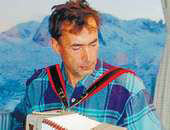 With Trad
II, Hubert von Goisern released his fourth album in three years.
As on Trad (released in March 2001), he
has recorded folk songs from his immediate homeland, the Salzkammergut.
Since spring 2001, Hubert von Goisern gave about 200 concerts in, apart
from half of Europe, Egypt and West Africa. Last summer for example,
he inspired people in co-operation with Mohamed Mounir, who similarly
to Goisern, combines the musical tradition of his homeland with pop.
With Trad
II, Hubert von Goisern released his fourth album in three years.
As on Trad (released in March 2001), he
has recorded folk songs from his immediate homeland, the Salzkammergut.
Since spring 2001, Hubert von Goisern gave about 200 concerts in, apart
from half of Europe, Egypt and West Africa. Last summer for example,
he inspired people in co-operation with Mohamed Mounir, who similarly
to Goisern, combines the musical tradition of his homeland with pop.
When did it become clear that there would be a second Trad CD?
Very soon after I had begun the first. There were still a few songs which I absolutely wanted to do, but for which there was no more room on the first Trad.
Trad II is the fourth album in three years. In this time you have also played many concerts. Would you call yourself restless?
Perhaps I have a touch of manic traveller. But I have at least something gypsy-like in me.
On your travels, you experience how, in other cultures, traditional folk music plays an important role in everyday life. Why does our folk music no longer play this role?
It is still there in small areas. But much has been lost. It is probably partly down to the fact that a lot of our folk music has been nationalistically misused. But a mentality which works as if it was cosmopolitan and international is probably also to blame. Many simply believe that you become that by rejecting what is yours. Everything that has standing and reputation is taken from all over the world and at the same time you lose the openness for what is your own.
Is it not true that everything that comes from close by is automatically regarded much more critically?
The closeness simply makes the mysticism more difficult and that is a criterion for you finding something exciting. As long as something is not exactly known, as long as something has the exotic nature of distant lands and as long as above all you do not have to have a good look at your own world, there is simply always greater room for interpretation.
For Trad II, you have again chosen songs which come from your immediate homeland and which have accompanied you your whole life. Where is the mystery in these songs for you?
There are songs which simply give me goosebumps. I feel that mostly with yodels. Everything floats in an endless loop. That is why I find it particularly difficult to end a yodel (laughs).
In your work beyond the two Trad albums, you very strongly and effortlessly weave in other cultures, from Tibetan folk music to rock. Why isn't there the reverse case?
That is perhaps down to a privilege of the Western world. Here we can consume what arises elsewhere without a problem. It is more difficult the other way around. But the real evil is that we - in music too - are still confronted with a still existent colonisation madness, which is a pure economical history. We have never given others anything, but always only taken.
There is a conservative custodian lobby in the folk culture which heavily attacks your music. How do you define folk music for yourself?
I simply play things as I hear them. Unfortunately that is seen as if someone is now coming along and breaking something. I don't understand that. This music has, as the word "folk" alone shows, an all-embracing character. To want to conserve something like that under the guise of the only true and good version - that is the death of this culture. Apart from that, who may presume to determine what the "right" version of a song, often only verbally delivered over a long time, is? I take something that will also be called "property of the folk". And we are all folk. So it is music for everybody.
But it will not perceived like that.
But that it changes cannot only be the task for artists. I mean: I have been playing again for three years and nevertheless I ask myself every day to whom, when I will play again. I also really don't want to complain. I have sold out concerts. But apart from those who come, nobody else hears it. As I said, I'm not complaining. Lots of people come. I sell my CDs and can do what I want. Nevertheless, it is astounding that there is no room for someone like me in the mass media. That it doesn't matter to the ORF regional programme what is happening in this country.
They simply worry about the easily marketable mainstream.
It could be that I do not move in the mainstream, à la Britney Spears, that my music is unwieldy. On the other hand: what would be more mainstream than folk music?
So what is the aim of the Trad recordings? A revival of folk music?
I actually don't want to have to explain it. Such a scientific thing seems to be an unsolvable task for me with something like folk music. It's clear that I have a something like a function as a disseminator - also as far as folk music is concerned. But basically I just hope that when listening to the songs, a similar casual atmosphere arises as we had when recording them.
Hubert von Goisern - Trad II
It was a seclusion, almost a cloister, and that's why Hubert von Goisern also thought nothing of dragging his whole studio up the Krippenstein, 2100 metres high in the Dachstein massif. He didn't just drag himself up there one time - the mixing desks, amplifiers, instruments, compressors and filters made their way up three times in total. The expenditure was worth it: Trad II is finished and it is more atmospheric, more intimate, more devoted than the first one.
There was this hotel standing empty on the mountain, and somehow Hubert knew: That would be the right place for the production. "Actually we only wanted to record the music up there," he says. "Then we moved down again to Salzburg for the rest. There we noticed: that's not right."
So, up again, post production. But at least the mixing should be successful in the valley? None of that - the studio wandered up again for a third time. The musicians were, Hubert says, impressed "by the great nature, by the glacier, by this enormous rock." Important for him: "Nobody could leave. When you record in the city, everybody goes home in the evening. Here, everyone has to stay. That gave it a quite different intensity. And at the end, we all went into the valley with melancholy."
The musicians came from five different countries: from Austria, Italy, Germany, England and Switzerland. However, more important for Hubert than the different nationalities is the personal music story each person brings with them: "Most of them had never had much to do with this type of music before." When had anyone ever engaged a slide guitarist for him to play a country dance? A violin mixed with a yodel and a drum set? But, says Hubert, they carefully paid attention to not blowing it up, not over-producing: "The pieces are almost chamber music. You quickly do too much."
They are pieces he has known for years, which are part of his life story. "I listen to something, think it beautiful, then I lay it away. Sometime it surfaces again" - partly even during production, he rummaged about in his cassettes, in search of this country dance, this yodel, and the next morning, the band had a new task to deal with. The songs are coarse and sentimental, covertly erotic and bluntly comical, they sound honest, with all one's heart and completely unacademic - as they were perhaps sung and played before, as no folk music custodians would have ever wanted to specify it sounds according to their opinion.
The listener also notices: that the musicians tackle the music with respect, but not with inadequate reverence. Therefore it goes a good step further than on Trad I, and that can be heard straight away: The first piece is called Kohler, after an archaic yodel, an electronic drum loop begins. That is fine - the loop neither destroys the folk music and nor does the folk music repel it as humans would a foreign body. That sounds organic, different in the equality and equal in the different quality. "And what others think of it," says Hubert, "doesn't really matter to us."
Trad II returns folk music its dignity, frees it from the concrete of the mere custodians and in such a way brings it to life and a vitality which was always in it. Gustav Mahler, who drew a great deal from Austrian folk music, said: "Tradition is the passing on of fire and not the adoration of ash." Hubert von Goisern's new album lights up folk music, with a fire at 2100m, in February, very close to the glacier.
Taken from good tradition
Hubert von Goisern has presented his CD Trad II and also his new band on the snowy peak of the Krippenstein
When Hubert von Goisern transported the complete equipment for a sound studio on a cable car to a height of more than 2000m on Krippenstein last winter, it was above all about the co-operation with good musicians. "I said to myself, if nothing usable should come out of it, it's ok if we have just spent two nice weeks with one another."
But the CD Trad II (Lawine/BMG) came out of it, which he has now presented on the already snowy Krippenstein in the Salzkammergut. With folk tunes, powerful yodels and new, fresh spirit.
The breeding ground for it was the silence of the solitude, whose magic sharpens concentration and is good for the mind. "It was very strange: confined in the long shut hotel, to which, after 5pm when the last cable car had gone, nobody could come up and nobody could go down," co-producer Wolfgang Spannberger outlined the working conditions.
The musicians who played with Hubert von Goisern, are Monika Drasch, singer and violinist who changed to the Goiserer after "her" formation, the Bairisch Diatonischer Jodel-Wahnsinn was disbanded, the Swiss guitarist Max Lässer, Arnulf Lindner on double bass, who was present on Trad I, and Bernd Bechtloff, percussionist, who has "goisered" since 1998.
And Fernsehsaga director Julian Pölsler is translating Trad II into film. It will be filmed until 18th October on Krippenstein. Of course.
The Caribbean is on Krippenstein
Sounds from dizzy heights: Hubert von Goisern's new album Trad II
Rendezvous Krippenstein, a plateau in the Dachstein massif of the Salzkammergut. Here in an empty hotel, Hubert von Goisern presents his new album Trad II (BMG Ariola 82876 52640 2), which will be on the market from Monday. The meeting at dizzy heights, already scenery for winter fairytale at the beginning of October, is no chance. Because the album arose here. A CD with sensitive music. Three times the bandleader and his team took their instruments and the sound equipment on the cable car to Krippenstein, assembled, dismantled, searched for and found the real team spirit on the spot as a work group and as flat mates. Von Goisern: "For me, mountains mean seclusion and concentration, naturally also a bit of magic mountain romanticism in this old hotel. What comes out under such conditions can be very valuable and intensive."
Conditions which the "boss" stipulates? "No, everybody joined in because they wanted to, there was no obligation. The great thing in this story was that we could go to work without outer and inner pressure, so we could fully enjoy the experiment."
Trad II is the continuation of the album Trad I which was released in 1999 (sic). Von Goisern knew back then that his folk music collection was not yet complete. "There was a lot left over, which didn't fit on the record. And it clear back then that there should and would be a second part."
The reflection on roots is not just chance: "If I have learned one thing on my travels, it is that we are all the same. And that folk music is the heart of each style of music."
Hubert von Goisern's folk music does not absolutely sound like many custom-protectors think it should. So on the new CD a smart yodel meets the Caribbean steel guitar, then to be superceded by the electronic drum loop. "You should just try it once. And you will see, it fits wonderfully well together!"
And when he thinks about all the thousand percenters who believe they know exactly how folk music sounds, then the recording artist feels malicious joy or even defiance: "It's all the same to us what they think about it." The sun sets, the shadows over the snowy rocky fields lengthen, a magical twilight spreads. No more time to talk at more than 2000m, on a mountain, which Hubert von Goisern was first on when he was four years old.
The diatonic is unpacked; and together with his musicians, he now plays the soundtrack for the scene. Music for a superior feeling of being alive.
"Folk songs are the musical ABC"
Hubert von Goisern presents his new CD Trad 2 on Krippenstein
The cable of the Dachstein cable car is lost in wisps of mist. Mountain pines cower under the weight of fresh snow. Up on the Krippenstein, the sky opens up. A yodel pushes out from the loudspeakers in the direction of the Dachstein plateau. On Monday, Hubert von Goisern presented his folk song collection at a height of 2100m. The OÖN met him for an interview.
What do you look for in the mountains?
The single layer. I look for situations which completely reflect me on myself and I find that as soon as possible in the great nature. For me, that means deserted places, no or only a few signs of civilisation.
 Why
did you make Trad?
Why
did you make Trad?
When my boy went to secondary school, I asked him: "What do you sing? He said: We don't sing. Then I went to the music teacher. He said: They don't want to sing. So I said: What happens when they say, we don't want to count? Do you have a substitute programme then too? He said: That is something completely different. I don't think so. For me, a musical education, a singing education also belongs to school. On the first Trad, the class sang along on Hinter meiner Stadltür. It dawned on me: that folk songs are the musical ABC. It is simple music. But simple does not means that it is not beautiful.
What do you advise someone who wants to learn to yodel?
I would tell them that I learned when I was 37 years old. I also thought that you had to be born yodelling or it simply doesn't work. I put on a cassette, on which a 12 year old girl had yodelled. There was a yodel on it which moved me to tears. I copied it out. Then I put my Walkman in my ears and went onto a motorway bridge in Regensburg and I yodelled there for three hours. Nobody heard me there, because it is terrible when you start. Years later, Tibetans told me that the practise their singing, which is also very physically difficult, by waterfalls. Because when you don't hear yourself, you feel it.
What is tradition for you: good or bad?
It is what it is. There have already been very many generations before us who have endeavoured to express what they feel. It has something good - and also something less good, namely the restriction. I stand by the tradition with which I have grown up, but I treat it critically.
